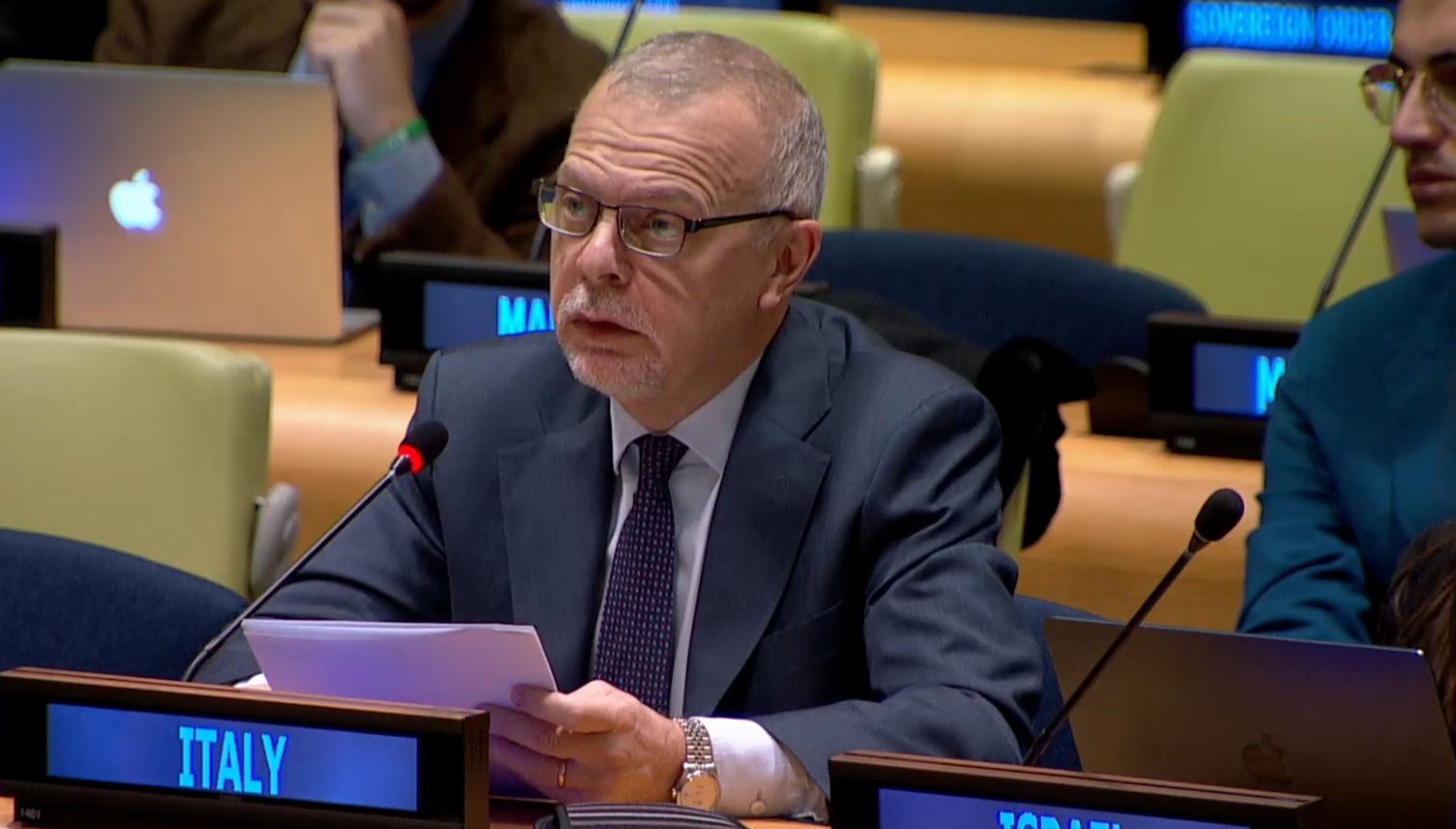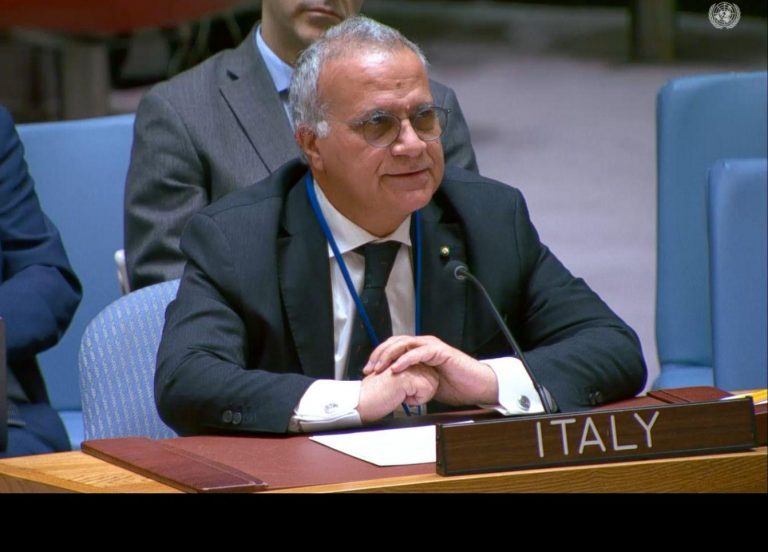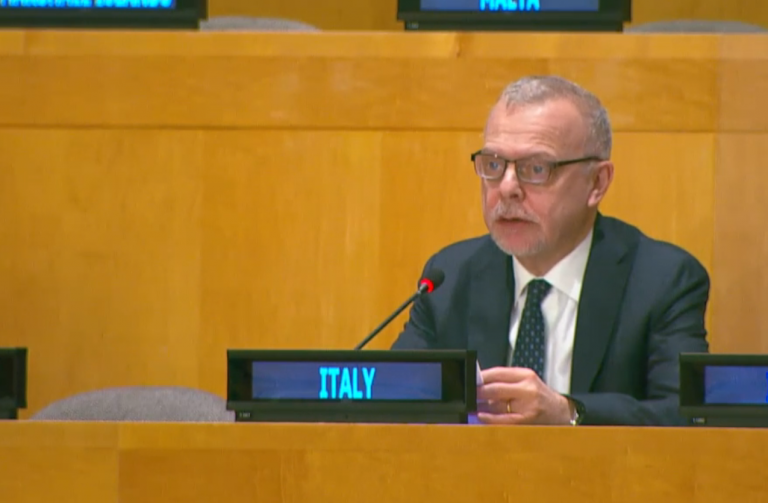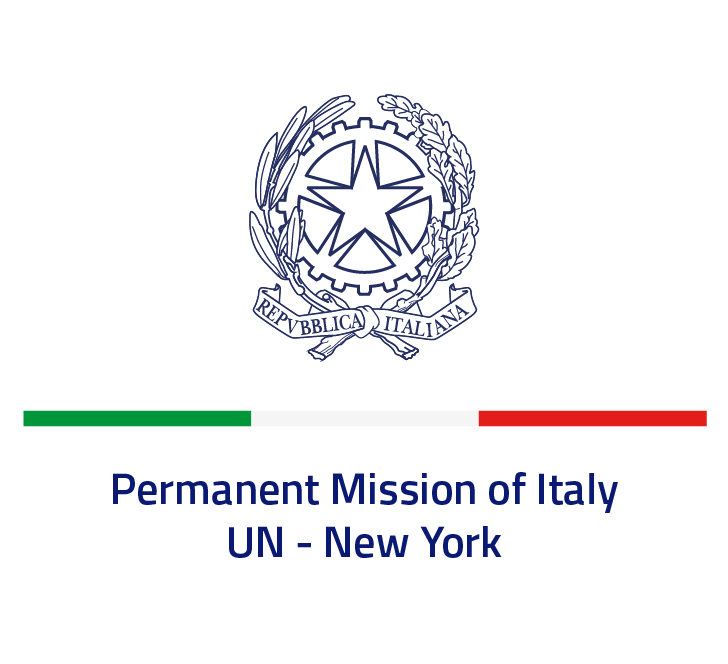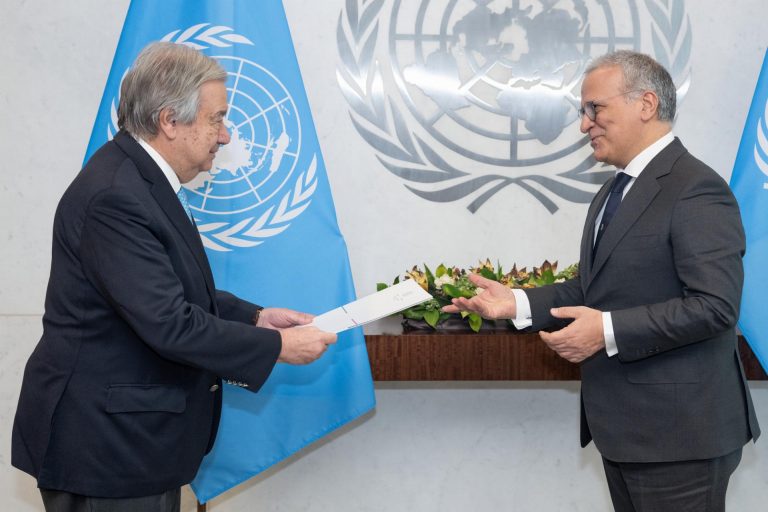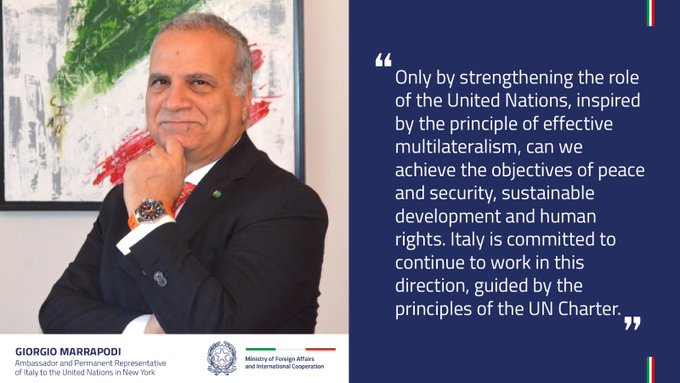Thank you, Madame Chair.
I will address the topics in cluster II by delivering an abridged version of our statement, the complete text of which has been submitted for publication.
** ** **
1) I will start by addressing the topic of “Immunity of State officials from foreign criminal jurisdiction”.
As a preliminary remark, Italy would like to commend the Special Rapporteur, Claudio Grossman Guiloff, for the excellent work, including by building upon his predecessor’s achievements.
Draft Article 7 is a crucial provision in the system of the Draft Articles, since it establishes whether exceptions and limitations to immunities ratione materiae apply for certain crimes under international law. In previous statements before the Sixth Committee, Italy expressed general support for Draft Article 7, without prejudice to the customary rules on immunities ratione personae.
Italy is mindful that this provision, given its importance, should be supported by the necessary State practice and opinio juris, if it aims to reflect the current state of play of customary international law. Should this provision represent instead a possible progressive development of international law, it should be supported by a decisive stance by the Commission, providing for a clear rationale and a persuasive explanation for the existence of this exception to immunity ratione materiae and the inclusion or exclusion of crimes under said exception. A considerable number of delegations (and some Members of the Commission) have challenged the content of Article 7. Italy considers that achieving consensus on these matters is essential. We therefore encourage the Commission to give these concerns due consideration in continuing its work on Article 7 and its Commentary.
Secondly, Italy will comment on the proposed texts of Draft Articles 9 and 14. Draft Article 9, paragraph 2, focuses on the moment in time in which the competent authorities should examine the question of immunity, namely “before initiating criminal proceedings” and “before taking coercive measures”. In Italy’s views, this general terminology may raise doubts, considering different practices within domestic criminal systems as to which moments or actions may substantiate the “commencement” of criminal proceedings. We call on the Commission to further reflect on the matter, so as to work out an alternative wording that may suit the vast array of domestic procedures.
Likewise, with regard to Draft Article 14, Italy has some reservations about the use of terms “before initiating criminal proceedings” with reference to the moment when the immunity should be determined. In particular, Italy would welcome the drafting of two different wordings for Draft Articles 9 and 14, in light of their different meanings and scopes. Indeed, while we certainly recognize the importance that the examination of immunity begins at a pre-trial stage, the determination of immunity ratione materiae requires a preliminary search for evidence and, under several domestic legal systems, a determination by a judge. Therefore, in Draft Article 14 we recommend the employment of a different expression that could set the time limit for the determination of immunity at a later stage, before the commencement of the trial. Italy acknowledges the Commission’s difficult task of identifying terms and moments that might take into consideration different domestic criminal systems, but we consider this issue to be of primary importance.
Additionally, Italy notes that paragraph 3 in Draft Article 14 involves that, in cases covered by Draft Article 7, the determination of immunity by the forum State should be undertaken by authorities at “appropriate high level”. It should be noted that, in certain legal systems, this assessment is carried out by the judge assigned to the case, and there are no rules allowing such assessments to be entrusted to other “high-level” judicial or political bodies. Furthermore, the requirement proposed by the Commission does not seem to be reflected in the practice of Member States, which shows that, even for the most serious crimes, decisions on immunity are taken by authorities at all levels. We call on the Commission to reconsider the matter, in order to capture the idea that the competent authority for the determination of the immunity is identified based on the provisions of the relevant domestic legal system.
In commending the Commission for its work on the subject-matter, Italy reiterates the importance for the Commission to clearly indicate which Draft Articles reflect existing customary international law and which constitute progressive development – the latter being closely linked to the preparation of draft conventions in accordance with article 15 of the ILC Statute.
We look forward to continuing the engagement with the International Law Commission and the Special Rapporteur in their work on this important subject.
We look forward to continuing the engagement with the International Law Commission and the Special Rapporteur in their work on this important subject.
** **
2) Madame Chair,
I will now address the topic of “Subsidiary means for the determination of rules of international law”.
We wish to thank the Special Rapporteur, Mr. Charles Chernor Jalloh, and commend his continued work.
Italy takes note of the provisional adoption, by the Drafting Committee, on first reading of the draft conclusions 1 to 13. We positively note the new structure given to the draft conclusions, which now appears to be more functional and to provide further internal consistency.
We wish to refer to our written statement and today we would like to focus our comments on draft conclusion 9, “Weight of teachings”. We support the insertion of such provision, in line with similar draft conclusions 7 and 13. We take note of the challenges reported by the Drafting Committee in setting out additional criteria for the consideration of teachings, beyond those listed in draft conclusion 4. We encourage the Special Rapporteur to provide in the commentary a better understanding of their application to the specific category of teachings.
** ** *
3) Madame Chair,
I will now turn to the topic “Settlement of disputes to which international organizations are parties”.
We commend the work of the Special Rapporteur, August Reinisch, and express appreciation for his third report on the matter. As a host country to several international organizations, Italy positively notes the account, offered in the report, of the contribution provided by the Italian judiciary, through its extensive case law, for a better understanding of the core features of the subject in question. We encourage the Special Rapporteur to keep devoting special attention to the practice of host countries, whose approach and stance is particularly relevant in setting the trends and steer developments on the topic.
Madame Chair,
This year’s report offers an interesting account of the practice of international organizations to resort, for their disputes with private parties, to the same means traditionally available to subjects of international law (namely, States and international organizations). However, it is important to consider possible inherent limitations of the said means should the parties not be placed on a fully equal footing. Therefore, we are convinced that means referred to in draft guideline 2, subparagraph c, may be resorted to in disputes with private parties to the extent that two main requirements are met: that the assessment process is fully transparent and that the private party is fully involved in the choice of the means, in full accordance with the principle of freedom of choice that governs their use.
At the same time, Italy reiterates its clear preference for binding means of dispute settlement, to ensure legal certainty and clear recognition of respective rights and obligations. Against this backdrop, we acknowledge the merits of arbitration, including the free choice of arbitrators and the special expertise the latter can bring when matters related to international commercial contracts are called into question. However, given the costs of arbitration, resort to courts may be some time more convenient, for example in disputes with SMEs or for claims of a low to medium value.
Madame Chair,
Italy is well aware of the rationale behind the immunities of international organizations and is fully committed to respecting, as appropriate, the immunities pertaining to organizations based in our country. At the same time, we take note of the report by the Special Rapporteur accounting for the different extents to which Member States may decide to grant immunities to international organizations, based on the relevant treaty. Such diversity may be reflected in draft guideline 9, by adding the wording “as determined by the relevant convention” right after the incipit “The jurisdictional immunity of international organizations […]”. This would serve to highlight the primacy of the relevant founding treaty, convention on privileges and immunities or host agreement in determining the existence and scope of the jurisdictional immunities of an international organization.
In addition, a second paragraph may be added on the question of the waiver of immunities. In this respect, while reiterating that jurisdictional immunity is an essential tool for the safeguard of international organizations in the independent fulfilling of their institutional goals, more attention should be devoted to cases and circumstances when such immunities should be waived. This may be especially true in cases where, in light of the legal issue or the subject matter at stake, the judicial proceedings clearly do not infringe upon the independent performance of their institutional functions as determined by the constituent treaty.
** ** **
4) Madame Chair,
I will now address the topic of “Non-legally binding international agreements”.
Allow me to start by thanking the Special Rapporteur for his second report, discussing the first substantive issue, based on a thorough review of state practice and case law, and a first group of draft conclusions.
We appreciate the different views expressed on terminology, in particular as regards the use of the term “agreement” to name the topic under consideration – and in the subsequent draft conclusions, accordingly. While concurring with the primacy of the parties’ intention, it is Italy’s firm view that less ambiguous terms should be preferred, in order to draw a clear dividing line between binding and non-binding “instruments”. We reiterate our call to shift to this latter term, as the work on the topic progresses. Accordingly, we suggest the use of the term “participants” to non-binding instruments, rather than the concept of “parties to an agreement”.
As already mentioned, Italy agrees that the intention of the participants involved should be the primary reference to determine the non-binding character of the instrument under consideration, on a case-by-case approach. No other factor should be able to override such intention when it is clearly stated, or when it can be clearly inferred. As for other indicators that may support such determination, the avoidance of terminology usually employed implying a commitment (such as “shall” or “enter into force”, to name a few) and the form of final clauses usually play a decisive role. At the same time, a specific clause on the non-binding character of the instrument may well serve the purpose, being it understood that its absence is not automatically considered – a contrario – evidence of a binding nature. On the whole, we suggest keeping the draft conclusions as concise as possible, leaving examples of such indicators for the commentaries, while avoiding prescriptive and closed lists.
Italy looks forward to continuing its engagement with the Special Rapporteur and the Commission on the consideration of such an important topic.
** ** **
5) Madame Chair,
I will now address the topic of “Prevention and repression of piracy and armed robbery at sea”.
First of all, Italy would like to welcome the new Special Rapporteur, Louis Savagodo, and to support the proposed schedule, particularly the drafting of five successive reports between 2026 and 2031, including the adoption of provisional articles.
As for the deployment of naval operations, Italy emphasizes the importance of studying the practice of naval operations deployed by regional international organizations to combat acts of piracy and armed robbery in maritime areas. We see merit in clarifying the legal bases of such operations and the limits on the use of force, especially when such operations are not expressly based on resolutions of the UN Security Council.
Italy is moreover in favour of adopting new articles concerning the use and status of armed security personnel on board merchant vessels, following the legal developments that have occurred in this field. These new articles should aim at contributing to greater certainty on the legal issues raised by the increasing use of armed security personnel on board of merchant vessels in order to prevent and fight piracy and armed robbery at sea. In particular, Italy agrees with the preliminary assessment of the Special Rapporteur, according to which members of armed security personnel on merchant vessels acting as State agents benefit from immunities attached to their functions as confirmed in the arbitration award of the Enrica Lexie case, which has been recalled by the Special Rapporteur.
Italy notes that the issue of the right of innocent passage of merchant vessels with armed security personnel on board should also be analysed. Therefore, Italy welcomes the proposal of the Special Rapporteur in this regard.
** ** **
6) Madame Chair,
Turning finally to the topic “Succession of States in respect of State responsibility”, Italy thanks the Working Group and his Chair, Bimal N. Patel, for their work on the topic.
We recognize the significant challenges in further pursuing the work in question, stemming from the often-cited scarcity and inconsistency of State practice. Against this backdrop, we note that settlement through direct negotiations between and among the States involved is the standard approach, providing for adequate flexibility and full ownership of the process, also in light of the inherently political, rather than exclusively legal, nature of issues related to state succession.
While reiterating our support for the decision to discontinue the work on the topic, we look forward to the report, which we are confident will serve as an important term of reference for practitioners and academics alike.
That concludes Italy’s statement on Cluster II.
Thank you, Madame Chair.







